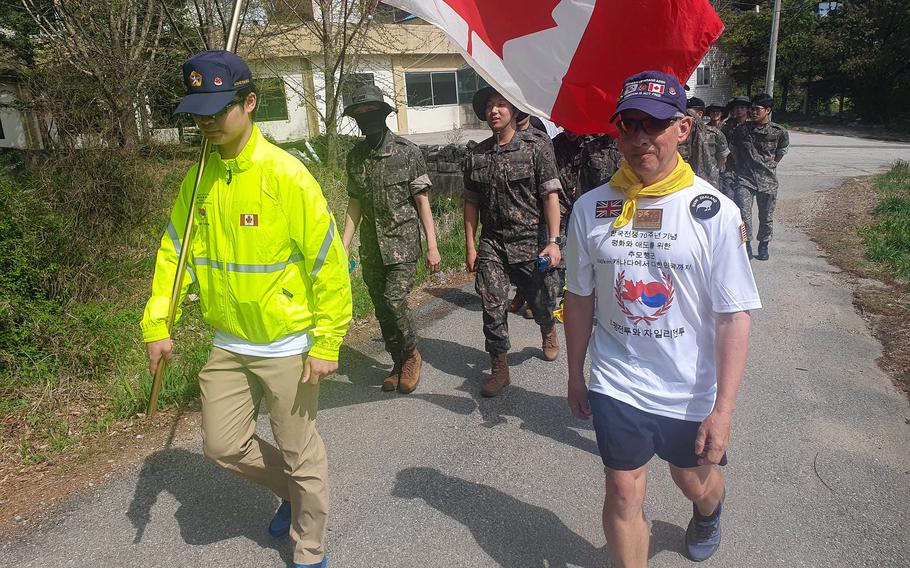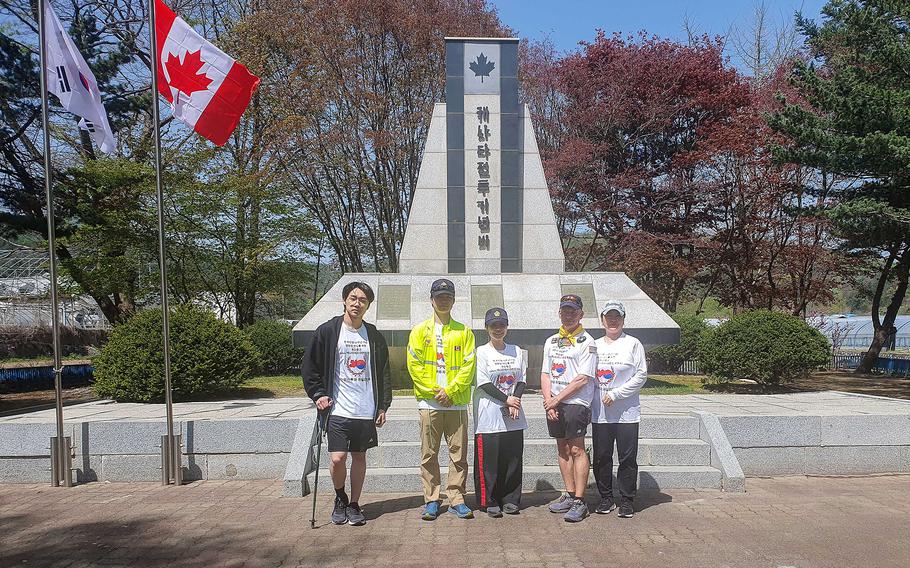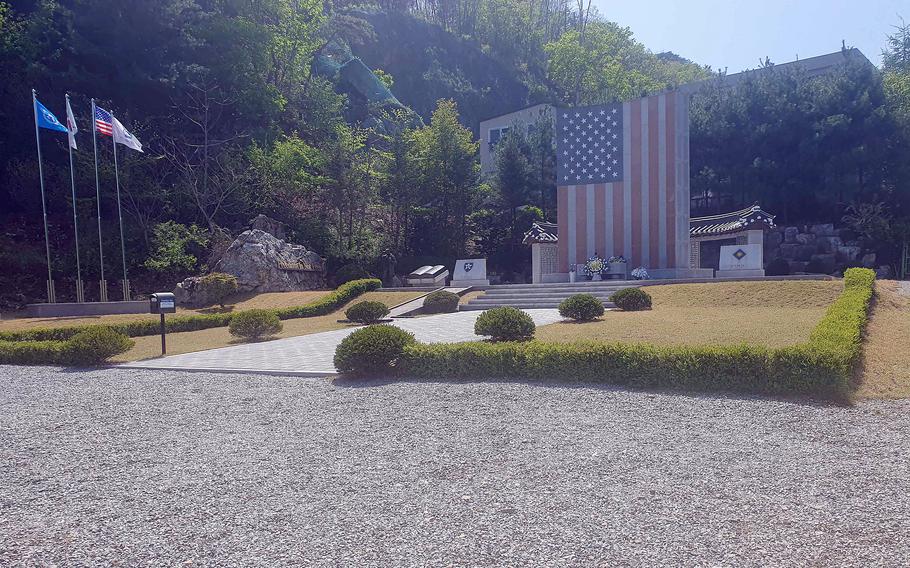
Guy Black walks to commemorate the Battle of Kapyong with cadets from the South Korean military academy in Gapyeong, South Korea, April 21, 2023. (Christopher Green/Stars and Stripes)
GAPYEONG, South Korea – A Canadian with a penchant for fostering the memory of his nation’s military service recently walked nearly 200 miles to a hilltop where his countrymen distinguished themselves in the Korean War.
Guy Black spent more than 2 ½ years planning and training for his trek, which began in British Columbia and concluded at the Kapyong battlefield east of Seoul. He timed his walk to coincide with the 70th anniversary of the conflict’s end.
“I hope that I can inspire more people to do something for remembrance,” he said April 21 at the Kapyong memorial. “I want people to just know more about the Korean War. I would like veterans to get more recognition and I hope that this walk gets people to remember and also do something that was worthy of a tribute to these people.”
The Battle of Kapyong, or Gapyeong, April 23-25, 1951, belonged to the outnumbered Canadian and Australian troops of the 27th British Commonwealth Infantry Brigade who prevailed over their adversaries in three larger Chinese regiments.
Ten Canadians lost their lives and another 23 were wounded, according to Veterans Affairs Canada. The Australians lost 32 killed and 59 wounded. An estimated 2,000 Chinese soldiers were killed or wounded.

Guy Black poses with family members at the Canadian Korean War Memorial Garden in Gapyeong, South Korea, April 21, 2023. (Christopher Green/Stars and Stripes)
ANZAC Day
The battle concluded April 25, ANZAC Day, on which Australians and New Zealanders remember their war dead. Australian air force Group Capt. Lyle Holt, who leads U.N. Command, Rear, at Yokota Air Base, Japan, delivered the address at the ANZAC memorial at Kapyong on Wednesday.
The 3rd Royal Australian Regiment, on Hill 504 north of Kapyong village, fought off waves of Chinese attackers starting April 24, 1951, Holt said by Facebook Messenger on Friday. “3RAR held firm, and on the afternoon of 25 April the exhausted Chinese abandoned their attack,” he said.
During his speech and while walking the Australian positions, “I could vividly imagine what this valley might have looked like 72 years ago,” he said. “The men who fought then, and their families, would be proud of what their sacrifices enabled across [South Korea] today.”
Holt’s uncle, Patrick Joseph Holt, fought at Kapyong.
While the Australians fought, Lt. Col. Jim Stone, commander of Canadian battalion, ordered his 700 men to dig in atop nearby Hill 677. The Chinese troops pummeled the Canadians with heavy fire and eventually surrounded them. Stone refused to withdraw, and the Canadians instead called for artillery strikes on their own position and resupplied by air kept their attackers at bay.
For their deeds at Kapyong, the 2nd Battalion of Princess Patricia's Canadian Light Infantry and the 3rd Royal Australian Regiment were awarded U.S. Presidential Unit Citations, a rare honor for foreign military units.

Guy Black, 58, spent more than 2 ½ years planning and training for his trek, which began in British Columbia and concluded at the Kapyong battlefield east of Seoul. (Christopher Green/Stars and Stri)
Battlefield pilgrimage
Black said he has written newspaper and magazine articles about Canada’s part in the Korean War, and helped with more than 35 proclamations honoring that service for communities in British Columbia.
The first leg of his trek began with a 16-mile walk from Black’s home in Coquitlam, British Columbia, to the Gapyeong Stone Korean War Memorial in nearby Langley, and then more than 60 miles to Vancouver Airport, where he departed for Seoul.
After arriving April 14 in South Korea, Black, his wife and their two sons walked 20 miles from the airport their first day and 21 miles the next day.
Black made a shorter, commemorative walk two years ago to mark the 70th anniversary of the battle itself.
“After I did the walk in 2021, I just kept training a lot more running, like hill running every week and long walking,” he said. “That makes up for my age.”
Along his route this year in South Korea, he was joined by members of South Korean Veterans Association, Freedom League and Democratic Peaceful Unification Advisory Committee.
His entourage walked 15 miles with him to the Commonwealth memorials. They were joined by cadets of the South Korean military academy and hikers they met along the way, Black said.
The weeklong, 186-mile trek concluded on April 21 with an ascent of steep, narrow Hill 677 in Buk-myeon overlooking the Kapyong River Valley.
“The support from everyone was really cool, I hope will be spread to a lot of people and they'll know more about Canada's contribution to the Korean War.”